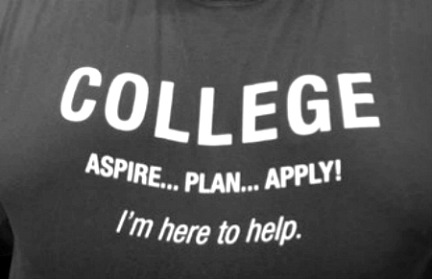While I have always found college graduations emotional because of their significance, it is high school graduations that provoke all kinds of feelings for me. As a college adviser for high school students for a few years, I had the opportunity of hearing my students’ hopes and dreams and they were limitless. Their tenacity and determination to be the first in their families to graduate high school and pursue a higher education was all the motivation I needed to show up even more energized day after day. Of all the students I worked with during the last two years, I have had 100% of my students graduate high school and over 95% of them commit to continuing their education in a higher education setting. While seeing those students cross the stage at their high school graduation made me feel a sense of pride I didn’t even know existed, it was seeing other students graduate and have unclear plans post-high school that really broke my heart.
This is why I am such an advocate for ensuring we ALL have the resources necessary to mentor, guide, and support any high school student we know. I am not asking that everyone become a financial aid expert, but if we can ensure that everyone at least knows the basics to college application requirements and deadlines, then we can all become a stronger village for all students.
I share this because not too long ago, the University of California released a new video with tips on how to respond to the dreaded Personal Insight Questions, the four questions Seniors will need to answer to submit a complete UC application and it made me reflect on a reality that we need to work against: for every ten Seniors that I have worked with, I can confidently say that for at least nine of them, what kept them from applying to more colleges and universities was that they procrastinated writing their personal essays and insight questions and thus felt unprepared to apply. Given how many resources are available, this is a problem we can help avoid. So here is my ask: reach out to every junior in high school you may know and ask them: “have you started your college applications?” If “yes,” then ask follow-up questions to ensure they are not selling themselves short — students who feel supported and know someone else believes in them have demonstrated a boost in self-confidence.
If they say “no”, guide them towards these resources:
- The College Board “My Big Future” guide: Provides a list of things juniors should be doing over the summer as they prepare for senior year.
- SAT Deadlines: The SAT is a standardized test widely used for college admissions in the United States. For the first time, the SAT will also be offered over the summer. This provides students one extra opportunity to test and the deadline to register for this test is July 28. It is recommended students take the SAT at least twice as colleges and universities will take their highest scores so the more times they take it, the better!
- ACT: This is the nation’s most popular college entrance exam accepted and valued by all universities and colleges in the United States. The ACT is based on what students learn in high school and provides personalized information about their strengths for education and career planning. It is recommended students take both the SAT and ACT; whichever test they feel is most fitting, should be taken at least twice.
- A-G Requirements: It is important for everyone to have access to the A-G requirements list as this will be what ultimately determines what schools students are eligible for. My recommendation is that they not settle for the “minimum” criteria and rather do an extra year of every subject area if possible. That is called being a “competitive candidate.”
- The UC Application: If they meet the minimum 3.0 A-G GPA, students should get to work on these as soon as the UC application opens, which is over the summer. The sooner they get started, the sooner they can have advisers looking over their work to ensure they are completed applications.
- CSU Mentor: While some students may apply to Cal States through their high school’s specific site, if a student is graduating with the A-G requirements met and at least a 2.5, there are options within the CSUs. It is our responsibility to encourage them to at least give it a try.
- Common Application: Encourage students to also look beyond CA. The opportunities are available all across the country and the sooner they open an application and start adding schools to their account, the sooner they can organize themselves and figure out how many recommendations they will need.
- Scholarships: Money is the dreaded topic when discussing college so the sooner students start searching for scholarships, the more accessible college will be.
- FAFSA: New reporting deadlines. Students can file their financial aid application as early as October – no more waiting!
There are hundreds of resources available for students as they plan for college. If every one of us takes the time to refresh our understanding of the application process and requirements by simply reviewing the resources above, we can impact the lives of many students who are in need of someone to guide them. It takes a village to raise a child — let’s strengthen our La Comadre village and prepare the next generation of leaders for college. Together we can change more narratives.

